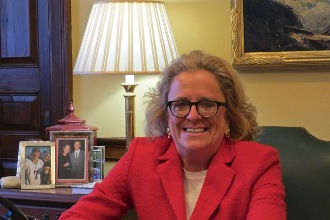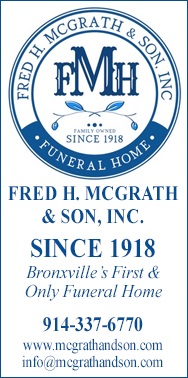From the Mayor: State's 2% Tax Cap Is Bad for Communities
Written by Mary C. Marvin

Feb. 25, 2015: The constraints of the state’s 2% tax cap are again front and center as the trustees and I develop the village budget for the fiscal year 2015-2016.
Since its inception, I have been a vocal critic of the tax cap, primarily because of the disincentive it created to repair aging infrastructure and the underlying philosophy that Albany knows local needs best.
At the March board of trustees meeting, I am confident that the trustees will once again vote to override the cap on principle, even though we have come under it every year save one.
We have always believed that our duty as elected officials is to advance the needs of the village taxpayer, not those of Albany politicians.
To reiterate, the tax cap is not a way to stop municipalities from growing and adding new services equating to more than a 2% tax increase.
In this climate of significant pension obligations, escalating health care costs, and increasing unfunded mandates that are completely beyond local control, no one is adding any services, rather, they are being eliminated in order to pay the bills.
If the village had made no cuts in our last budget, our "Albany" and health care costs alone would have raised taxes by almost 5%.
The New York State property tax cap and similar ones, including Proposition 13 in California and Massachusetts Proposition 2 ½, were intended to relieve tax burdens for homeowners and increase local government efficiency. However, studies undertaken to review their effectiveness, including a very comprehensive one here in New York undertaken by Cornell University, have proven otherwise.
Limiting local governments' taxing power generated unintended consequences such as drastic service cuts, regional inequities, and a neglect of aging infrastructure.
As illustration, using data from the New York State comptroller's office, the Cornell model projected that if the tax cap had been adopted in its current permutation ten years ago, local government revenue would be almost 30% lower, too low to maintain even remotely the level of services citizens expect.
Villages would be most severely constrained because of the heavy reliance on property tax revenue. As a consequence, today, statewide villages showed spending cuts across most services, with the deepest in the area of public safety.
Other long-term consequences identified by the researchers included development undertaken primarily to increase the tax rolls and not necessarily for the enhancement of the community, the proliferation of more government entities such as local improvement districts whose costs are exempt from the cap, and an increased reliance on state aid. As a side bar, New York State aid to municipalities has remained flat over the life of the cap, resulting in less aid in real dollars than was received over ten years ago. The promise of increased state aid and a decrease in unfunded mandates as a corollary to the cap legislation never materialized.
In addition, since infrastructure repair is not exempt from the tax cap for municipalities, though it is for the state and school district budgets, necessary repairs have been postponed throughout the state since the inception of the cap.
State Comptroller Thomas DiNapoli recently issued a very disconcerting report about New York's crumbling infrastructure. He estimated that communities statewide are undertaking less than 30% of the capital infrastructure projects that are needed right now.
The cap override provision also served to increase inherent inequities already existing among communities because override attempts have been much more successful in municipalities with above average income and education levels. The greater reliance on state aid has also disproportionally affected less wealthy communities when economic conditions change. Poorer communities were hit much harder when state aid dropped or remained flat.
In a nutshell, the Cornell study came to conclusions about the tax cap that I concur with heartily.
In their view, the ultimate effect has been to add to local fiscal stress and to encourage municipalities to cut services while not directly addressing rising expenditures and to create new layers of government by forming "special districts" to recapture revenues.
Also, development has been encouraged that has not always been beneficial to anything but the tax roll, and the override option has increased inherent inequalities among communities.
The Cornell researchers conclude that in order for the tax cap to be at all positive going forward, the New York State legislature must enact substantial mandate relief measures to lower the local tax burden and state aid must be increased. Exemptions to the cap must also be carved out for disaster relief and capital/infrastructure spending.
To me, the tax cap aptly demonstrates the old adage "if it's too good to be true, it probably is."
Financial & Legal Assistance Directory
Hymes & Associates, CPA, P.C.
Our firm provides outstanding service to our clients because of our dedication to the three underlying principles of professionalism, responsiveness, and quality.
Listed as one of the 10 largest firms by The Westchester Business Journal, we serve clients throughout the tri-state area. By combining our expertise, experience, and
the energy of our staff, each client receives close, personal and professional attention.
Our high standards, service, and specialized staff spell the difference between our outstanding performance and other firms. We make sure that every client
is served by the expertise of our whole firm.
Hymes & Associates, CPA, P.C.
55 Pondfield Road
Bronxville, NY 10708
914-961-1200
914-961-1715 (Fax)
Website: www.hymescpa.com
Baillie & Hershman
44 Pondfield Road, Suite - 12
Bronxville, N.Y. 10708
Office: 914-337-6300
Matthew W. Kerner, ESQ.
Direct Dial: 914-337-6569
Email: This email address is being protected from spambots. You need JavaScript enabled to view it.
Fax: 914-337-6913
Suzanne M. Bloomer, Esq.
Direct Dial: 914-337-0142
This email address is being protected from spambots. You need JavaScript enabled to view it.
Baillie & Hershman provides comprehensive Real Estate legal services for buyers, sellers, current owners, real estate agents and lenders. We also handle estate planning, including the drafting of wills.
Griffin, Coogan, Sulzer & Horgan, P.C.
Attorneys and Counselors at Law
Griffin, Googan, Sulzer & Horgan, R.C.
Located in Bronxville, New York, Griffin, Coogan, Sulzer & Horgan, P.C. takes great pride in providing our clients with comprehensive, high quality legal services in a responsive manner. The firm concentrates its practice in real estate law with a primary focus on issues relating to real estate tax litigation (also known as tax certiorari), real estate transactions, valuation law, real property taxation and tax planning and real property tax exemption matters throughout New York State.
The firm serves as general counsel for several local cooperatives and represents clients in various issues relating to wills, trusts and estate planning.
51 Pondfield Road
Bronxville, NY 10708
(914) 961-1300
This email address is being protected from spambots. You need JavaScript enabled to view it.
Nobile, Magarian & DiSalvo LLP
We are hardworking and dedicated attorneys who, combined, have more than 150 years of experience delivering quality legal advice. Our cutting edge is our ability to enter both the conference room and the courtroom with strength. Our law firm provides legal representation and counsel for both individual and business clients on issues related to estate planning and administration, real estate law, litigation, and business law. Our practice areas include: Commercial Litigation, Business Law, Real Estate, Wills, Estate Planning, Trusts, Estate Administration, Living Wills, Health Care Proxies, Powers of Attorney, Not For Profits, and Employment Law.
111 Kraft Avenue
Bronxville, NY 10708
914-337-6300
Veneruso, Curto, Schwartz & Curto, LLP
Veneruso, Curto, Schwartz & Curto is dedicated to providing businesses and individuals with exceptional legal services customized to each client's needs and objectives. Practice areas include litigation, real estate, not for profit, wills and estate planning, land use and zoning, business and corporate, cooperative and condominium and real estate tax assessment litigation.
The Hudson Valley Bank Building
35 East Grassy Sprain Road, Suite 400
Yonkers, New York 10710
914-779-1100
Aegis Capital
Steve brings 40 years of investing experience to his role as Senior Managing Director at Aegis Capital Corp., a prominent national securities firm.














